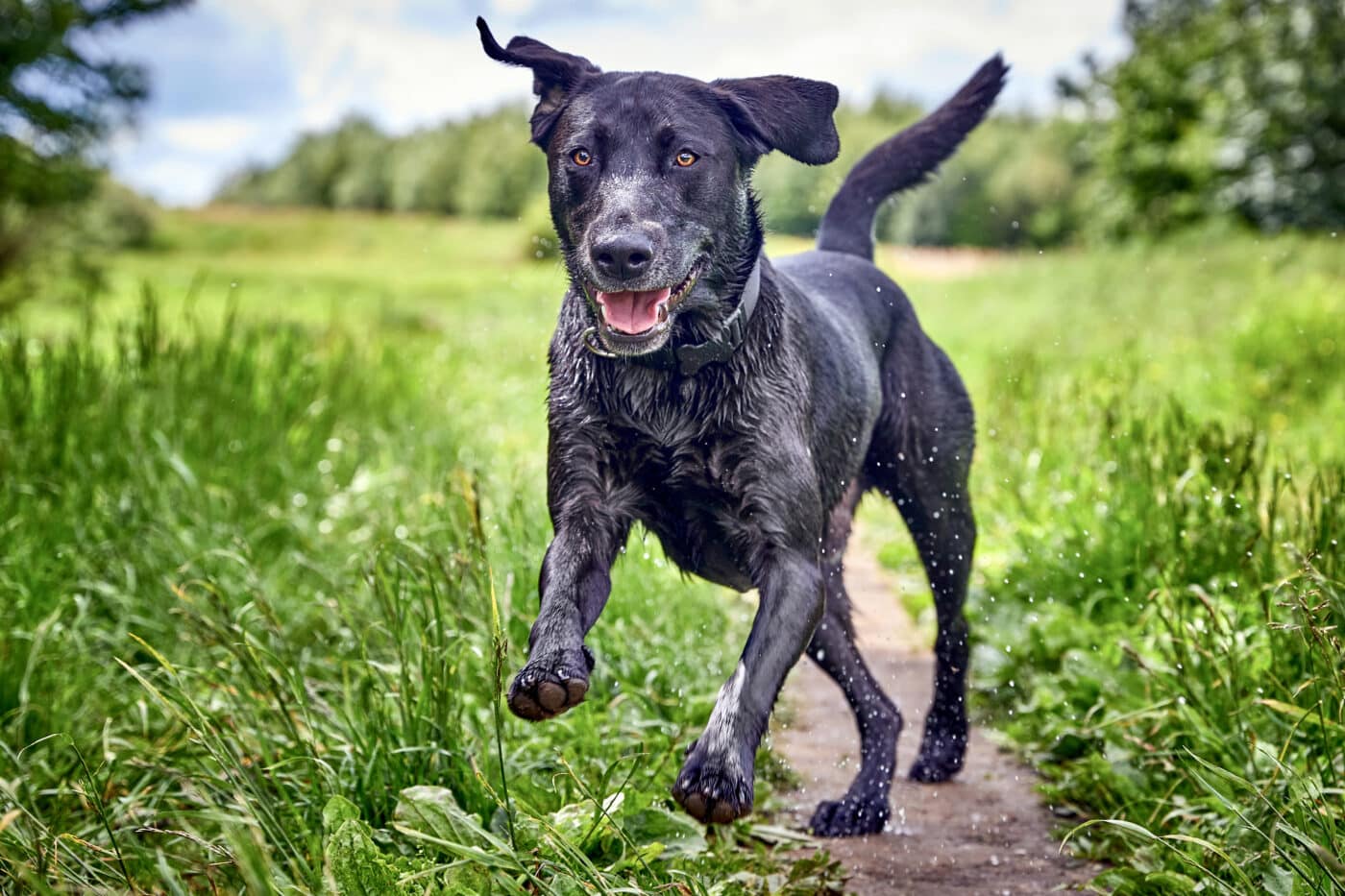 Shutterstock
Shutterstock
Dogs are often known for their loyalty and playfulness, but their intelligence is often underestimated. While many admire them for their ability to learn a few tricks, dogs possess a wide range of cognitive abilities that go far beyond basic obedience. From problem-solving and emotional understanding to recognizing human gestures, dogs demonstrate intelligence that may surprise even the most experienced owners. Their cognitive skills continue to evolve as they work closely with humans, showcasing just how much smarter dogs are than we typically give them credit for.
Dogs Can Understand Human Emotions
 Shutterstock
Shutterstock
It’s no secret that dogs are highly attuned to their owners’ emotions. Whether it’s recognizing when you’re feeling sad or picking up on your excitement, dogs can sense subtle changes in human behavior and react accordingly. Research has shown that dogs can not only differentiate between emotional states based on facial expressions but also respond to them. For example, if you’re upset, your dog might come over to comfort you by resting its head on your lap or snuggling up close. This deep understanding of human emotions demonstrates emotional intelligence far beyond mere training. Your dog can read your mood just as well as a close friend might, making them the ultimate empathetic companion.
Dogs Are Skilled Problem Solvers
 Shutterstock
Shutterstock
While many people think of dogs as simple creatures, they possess a surprising ability to solve problems. Many dogs are naturally curious and resourceful, and they can figure out how to open doors, retrieve hidden treats, or navigate obstacle courses. Puzzle toys designed to challenge a dog’s cognitive abilities have become popular, and they’re not just a passing trend. Dogs excel at figuring out how to manipulate objects or follow a sequence of actions to get a reward. This problem-solving ability is a clear indicator of a higher level of intelligence, especially since it often requires abstract thinking and reasoning, skills usually reserved for humans and some primates.
Dogs Can Read Our Body Language
 Shutterstock
Shutterstock
One of the reasons dogs excel at being companions is their ability to understand human body language. From subtle shifts in posture to changes in facial expression, dogs are highly observant creatures that pick up on non-verbal cues. Dogs are capable of reading human gestures, like pointing or nodding, and they can understand what these signals mean. For example, a dog will follow your pointed finger to locate an object or move in the direction you’re indicating. This ability is not inherent in all animals, making dogs’ social intelligence even more impressive. It’s this capacity for interpreting body language that helps dogs form strong bonds with humans and navigate social situations with ease.
Dogs Can Learn Hundreds of Words
 Shutterstock
Shutterstock
You may be familiar with the basic commands such as “sit,” “stay,” or “come,” but did you know that dogs can learn to recognize hundreds of words? Some highly intelligent breeds, like Border Collies, have been shown to comprehend more than 1,000 words, including the names of individual toys, people, and places. This linguistic ability demonstrates that dogs can associate specific words with actions, objects, or people, which requires a level of cognitive processing similar to human learning. The more you engage with your dog, the more words they can learn, proving that dogs have a far deeper understanding of language than we often give them credit for.
Dogs Have a Good Sense of Time
 Shutterstock
Shutterstock
While your dog might not be able to read a clock, research shows that dogs have an impressive ability to sense the passage of time. Dogs often follow a routine and are highly attuned to patterns in daily life. For example, they can predict when it’s time for their walk or when they’re about to return home. Studies have shown that dogs can distinguish between different durations of time and can even anticipate events based on regular patterns. This internal “clock” allows them to understand when certain activities, like meals or playtime, are about to occur. Dogs’ sensitivity to time is just another indication of how advanced their cognitive skills are.
Dogs Can Recognize Themselves in a Mirror
 Shutterstock
Shutterstock
Self-recognition is typically considered a hallmark of higher intelligence, and it’s a trait that has been demonstrated in some animals, such as primates and dolphins. Surprisingly, dogs are also capable of recognizing themselves in a mirror, although their reaction may not be what we expect. While many animals fail the “mirror test” (where they fail to recognize themselves and think the reflection is another animal), dogs tend to approach the mirror, sniff around, or examine their reflection. This shows that dogs can understand the concept of self, even if they don’t react the same way humans or some other animals might. This ability is a testament to their cognitive capabilities and their self-awareness.
Dogs Can Detect Changes in Human Health
 Shutterstock
Shutterstock
Dogs’ remarkable sense of smell has long been recognized, but did you know that it allows them to detect subtle changes in human health? Dogs can sense when their owners are about to experience a medical episode, such as a seizure, low blood sugar, or even an impending panic attack. Some trained dogs are capable of alerting their owners to these conditions before they even notice any symptoms themselves. There are stories of dogs alerting their owners to early signs of certain diseases, including cancer, just by sniffing changes in body odor. Their ability to detect these changes shows how attuned dogs are to human health and well-being, far beyond the scope of ordinary pet behavior.
Dogs Can Be Trained to Assist in Complex Tasks
 Shutterstock
Shutterstock
The role of service dogs has expanded beyond simple tasks like fetching the newspaper or carrying a basket. Today, dogs are trained to assist people with a variety of complex needs, from guiding people with visual impairments to alerting individuals with autism to important events. The training that service dogs undergo requires a high level of intelligence and the ability to learn a broad array of commands. This level of specialized learning speaks to their cognitive flexibility and adaptability. Dogs’ ability to assist with such important tasks not only shows their mental capabilities but also their deep connection to humans, proving just how valuable and intelligent they are.
Dogs Understand Cause and Effect
 Shutterstock
Shutterstock
Dogs are capable of understanding the concept of cause and effect, which is a critical cognitive skill that allows them to make predictions about the world around them. For instance, if a dog presses a lever or pushes a button and gets a treat as a result, they quickly learn the connection between the action and the reward. This ability helps dogs adapt to their environments and solve problems based on their experiences. Whether it’s understanding that sitting down results in a treat or that barking at the door might get someone to open it, dogs are constantly making cause-and-effect connections that demonstrate their advanced thinking.
The Tail End Of Genius
 Shutterstock
Shutterstock
Dogs are not just loyal and loving companions—they’re also incredibly intelligent. From problem-solving and understanding our emotions to detecting health changes, dogs are the unsung geniuses of the animal world. So, when your dog steals your socks or figures out how to open the pantry, don’t just think they’re being mischievous—they’re showing off their smarts. With all these surprising abilities, it’s clear that dogs are much smarter than we give them credit for. Next time you praise your dog, don’t forget to call them “brainiac”!
 Toledo, United States.
Toledo, United States.